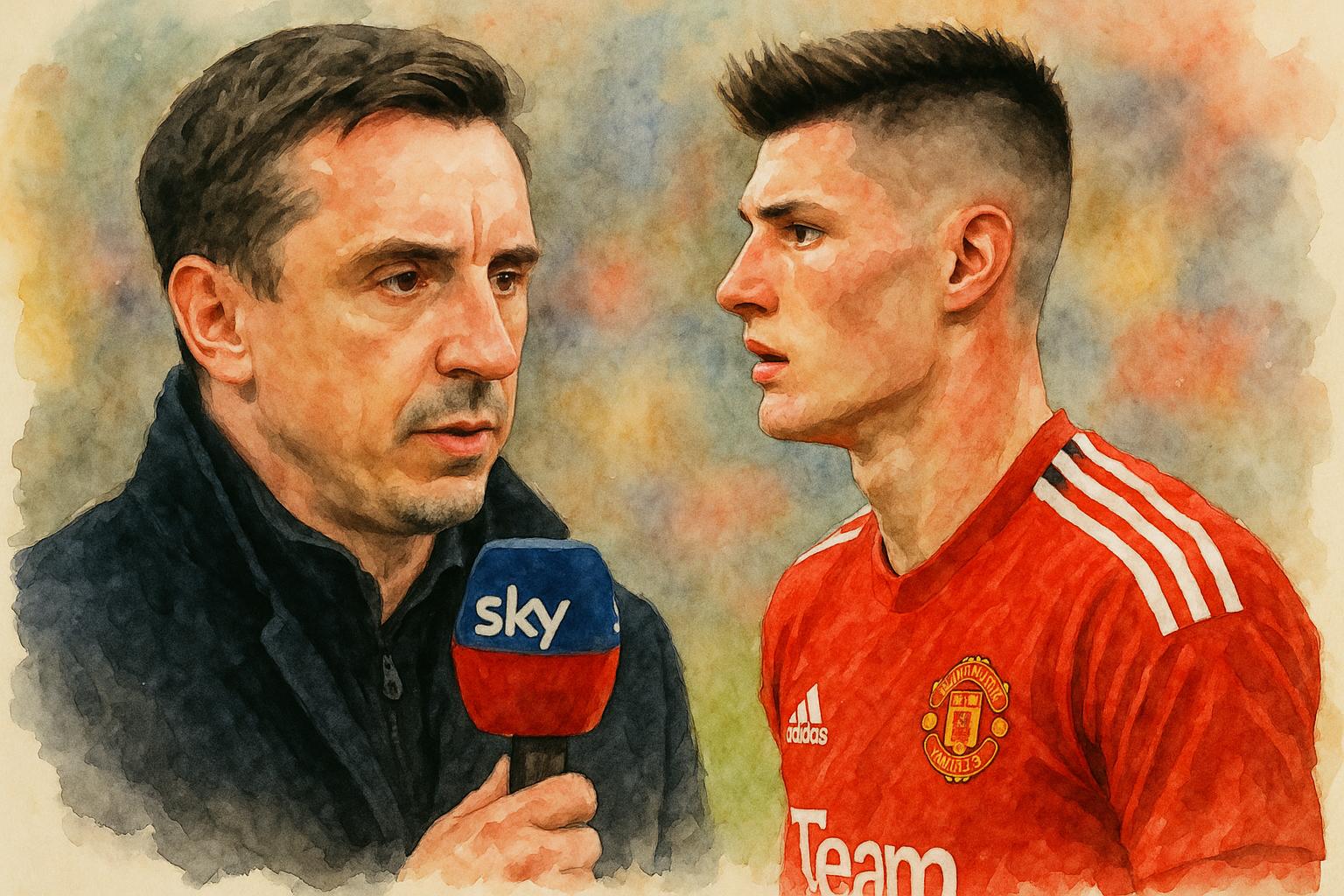Gary Neville arvioi suoraan Benjamin Šeškon tilanteen Manchester Unitedissa nuori hyökkääjä suurten odotusten ja paineiden keskellä
Manchester United is used to living under a microscope. Every misplaced pass, every dropped point, every struggling signing becomes headline material. And this year has been no different. Supporters came into the season wanting signs of revival, something to believe in, but more often than not they’ve been handed a sobering reminder that the club is still trying to rediscover its identity.
Into that storm walked Benjamin Šeško — a €76.5 million signing from RB Leipzig, billed as the striker who might finally lead United back to attacking dominance. For fans, his arrival carried a sense of hope, almost like a promise of salvation. But early impressions? Quiet. Perhaps too quiet.
A Start That Hasn’t Sparked
So far, Šeško’s minutes have been limited: just 62 across two substitute appearances. He hasn’t yet looked like the same dangerous forward who terrorized defenses in Germany last season. Instead of explosive runs or confident finishes, we’ve seen flashes that feel more like introductions than statements.
That hasn’t gone unnoticed. Gary Neville, never shy about speaking his mind on the club he once captained, was blunt in his assessment. Šeško, he said, is “a long way off full fitness.” It wasn’t just a comment about a single player — it sounded like a warning shot about United’s broader issues. When your biggest summer signing comes on and the game doesn’t change, fans start to worry.
A Cup Match as a Proving Ground
Neville also sketched a potential solution: give Šeško minutes, lots of them. In fact, he urged manager Rúben Amorim to start the 21‑year‑old in the upcoming League Cup tie against Grimsby. The logic is simple:
- You don’t sharpen a weapon by leaving it in its sheath.
- A cup fixture provides space away from Premier League pressure.
- It offers rhythm-building minutes in a competitive environment.
But Amorim doesn’t have an easy job. United isn’t just one player — it’s a puzzle of moving parts, and lately that puzzle hasn’t fit together well. Decisions in midfield against Fulham, like dropping Casemiro and shifting Mason Mount, left the team exposed. United lost control, looked fragile, and nearly dropped points that should have been safe. It’s a reminder that selecting Šeško isn’t a simple call — it ripples through the squad.
The Weight of a Price Tag
Part of the scrutiny Šeško faces has nothing to do with him as an individual and everything to do with the number attached to his signing. Young strikers often need patience, time to learn the physical and tactical demands of a new league. But £65 million doesn’t buy patience at Old Trafford. It buys expectations — instant impact, goals, and energy.
That’s the tightrope Šeško walks: judged not as a raw talent to develop, but as an investment fans and the club want to see paying off immediately. It’s not fair, but it is the reality.
A Club Still Fragile
United’s 3–2 win over Fulham revealed what so many supporters already knew: this team still feels brittle. Swapping one midfielder for another can unravel the balance. A substitution doesn’t shift momentum; it sometimes worsens it. Bringing on Šeško didn’t boost United against Fulham — if anything, the team seemed less assured with him on the pitch. Right now, he looks more like a long‑term project than a quick fix.
Neville cut through the noise. Šeško isn’t ready yet. He may have the talent, size, and movement — but he doesn’t yet have the sharpness or confidence to lead this team. The question isn’t whether he has the ability; it’s whether United has the time to let him get there.
What Comes Next
That’s why the Grimsby game is being talked about as more than just a routine cup fixture. For Šeško, it could be a turning point. A chance to score, to feel what it’s like to be the focal point of the attack, to show sparks of why United believed he was worth the gamble. Or, if it goes badly, it risks cementing the perception that he’s not ready yet — and in football, perceptions are hard to shake.
No one doubts his potential. Šeško is 21, powerful, technically sound, with the kind of skills that could blossom into a Premier League star. But United isn’t always kind to “potential.” It demands finished products now, especially when the investment is so high.
The Bigger Picture
Maybe that’s the bigger story here — not just Šeško’s struggles, but United’s. A club once defined by swaggering certainty now seems unsure of itself, placing enormous pressure on new arrivals to be saviors rather than contributors. And when those players stumble, the spotlight burns hotter.
Šeško will get more chances. Neville’s words were sharp, yes, but they were also rooted in a truth: he needs games, minutes, rhythm. Whether he can build that under the glare of Old Trafford remains to be seen.
For now, the young striker finds himself in the middle of United’s storm. The fans want goals. The manager wants stability. The pundits — Neville chief among them — demand progress. And Benjamin Šeško, still adjusting to English football, carries all of that on his shoulders.
The season is long. Redemption stories are possible. But at Manchester United, time is always in short supply.
